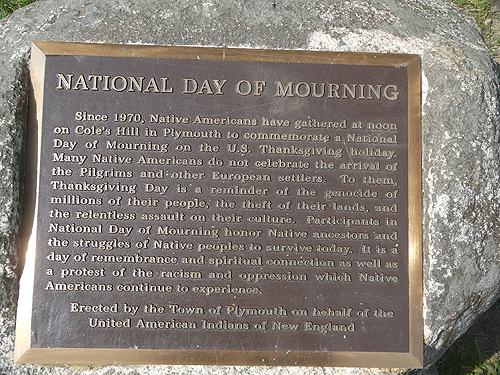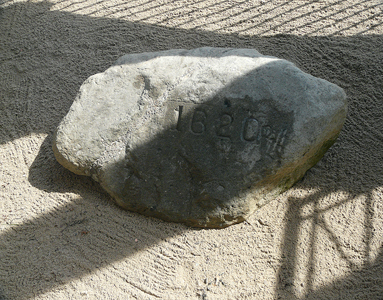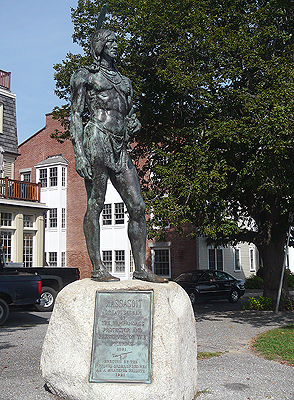Susie and I went to New England for a couple of weeks this summer. It’s a part of the country I had never really been to before, which meant that I probably tried to cram too much into the two weeks. Hey, you never know when you’re going to be back – maybe never. So what’s the point of driving from Cape Cod to Bah Hahbah, and not making a brief pit stop at Plymouth?
I grew up in Virginia, the son and grandson of Tidewaterites, so I got to see the Virginia pole of the colonial experience pretty extensively. Jamestown, Williamsburg, and Yorktown are all within a quick drive of each other, and we took advantage. But I had never been to the Massachusetts pole of the Axis of Colonial America, Plymouth. (Boston is sui generis, and could be the subject of a whole trip all by itself.)
You know the story. The Pilgrims land here in 1620…
…things don’t go so well for them, so the Indians step in, help out with food and local know-how, and everyone celebrates together.
A few yards from Massasoit is this rather sour marker:

Hey, it’s a free country. This group of Indians want to come to Plymouth and mourn the fact that they ended up dealing with the English rather than the Spanish, I guess that’s their right, but it’s shame that the 1998 settlement had the city of Plymouth put up a plaque celebrating that.
This is where it started, the northern part at least, and it’s wrong that the city where it all started is coerced into turning the holiday into another excuse for an apology for success and constitutional government.
Even then, it’s only half the story. It turns out that while the Indians did make the difference that first couple of years, the colony was really failing because it was a socialist experiment. Once the colonists figured out that people work harder when they work for themselves, things really took off:
It’s wrong to say that America was founded by capitalists. In fact, America was founded by socialists who had the humility to learn from their initial mistakes and embrace freedom. One of the earliest and arguably most historically significant North American colonies was Plymouth Colony, founded in 1620 in what is now known as Plymouth, Massachusetts. As I’ve outlined in greater detail here before (Lessons From a Capitalist Thanksgiving), the original colony had written into its charter a system of communal property and labor. As William Bradford recorded in his Of Plymouth Plantation, a people who had formerly been known for their virtue and hard work became lazy and unproductive. Resources were squandered, vegetables were allowed to rot on the ground and mass starvation was the result. And where there is starvation, there is plague. After 2 1/2 years, the leaders of the colony decided to abandon their socialist mandate and create a system which honored private property. The colony survived and thrived and the abundance which resulted was what was celebrated at that iconic Thanksgiving feast.
Perhaps not surprisingly, I really had no idea about this part of the story until I read about it in the Wall Street Journal about 10-15 years ago. The story I heard was the one that essentially leads to the conclusions at top: the Indians saved the day, and other than the nice meal, have been regretting it ever since. The whole part about the communitarian experiment gone wrong – is there any kind that goes right? – somehow slipped everyone’s mind. It’s right there in Bradford’s journals, as Bowyer point out. Instead, we spent a couple of months rehearsing the class play, an adaptation of Witch of Blackbird Pond.
This is a shame not just because it passes up a chance to teach an obvious lesson about economics and human nature. It also misses a chance to point out the roots of our Constitution. (Honestly, everything before 1787 should be taught as a lead-up to the Constitution. There’s a reason they wrote what they did; it didn’t just come out of nowhere.) The colonies really were different in outlook. New York was founded as a commercial colony. Massachusetts wasn’t and the Puritan ethic echoes still. Federalism wasn’t just a matter of keeping the federal government in check, it was also a way of respecting different outlooks on life.
I’m not such a big fan of politicizing our national holidays. The point of them is that their national, not partisan or political. They’re supposed to be things that we all celebrate or commemorate together. (We’ll talk about Christmas some other time.)
So let’s remember and be thankful that, for the fact that, even with all the unfortunate changes over the last few years, we’re still living in the only country founded on an idea, and hope that over time, we can find our way back to it.





